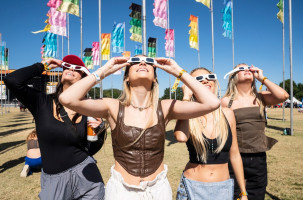American artists will still be allowed to travel to Cuba and perform at concerts for audiences on the island under new regulations laid out by the Department of Treasury last week, after President Donald Trump wielded his pen in Miami’s Little Havana neighborhood to “cancel” President Obama’s Cuba policy. But they can forget about staying at Havana’s luxurious Hotel Saratoga, like the Rolling Stones, Madonna and Beyoncé and Jay-Z have done. The new regulations suggest that U.S. music stars might want to start searching for a place to sleep on Airbnb.
That’s because the announced new rules prohibit Americans from spending money in any establishment in which the Cuban military, via its business arm, the Armed Forces Business Enterprises Group (known as GAESA), has a financial interest. That includes the Gaviota tourism group, which encompasses some 53 hotels according to its website, among them Havana’s Sheraton, which since 2016 is operated by Starwood Hotels and Resorts. Gaviota properties also include a car rental company with more than 100 offices around the country, and meeting and event venues. According to the Miami Herald, GAESA holdings make up 60 percent of Cuba's economy.
"It will be a little tougher to organize an event," predicts attorney Pedro Freyre, head of international practice at the Akerman law firm in Miami and an expert on U.S.-Cuba business relations. "You will have to navigate a minefield of who you can deal with: Can I sit at the table with this entity or not? Can I pay this entity or not? It’s a chilling effect when Uncle Sam is looking over your shoulder. The overall effect [of the revised regulations] will be a chilling one for travelers to Cuba, and that will affect the music world."
While the new rules seem set to make the already bureaucratic task of organizing a major music event in Cuba more complicated, they will also make it harder for music lovers to enjoy a leisurely weekend checking out Havana’s reggaeton scene or stumbling upon a Buena Vista Social Club-style band in a hotel bar.
Since 2016, U.S. citizens have been able to travel to Cuba individually, without requesting a special visa under the guise of so-called “people-to-people” travel, which is meant to foment democratic ideals through cultural exchange and personal contact between Americans and Cubans. Under the most recent guidelines, travelers themselves were responsible for making sure that their trip was not simply about drinking mojitos and going to the beach.
The new regulations announced last week, however, are expected to be implemented via amendments to the Treasury’s Cuban Assets Control Regulations and the Commerce Department’s Export Administration Regulations, in a process that could take months. From then on, travelers who have not already booked upcoming trips on their own will have to travel to Cuba as part of a group, for a specific educational purpose, which includes exploring the island’s music and culture. This requirement, which existed before Obama’s loosening of regulations, is to be put back in place despite the fact that U.S. airlines, cruise ships and Airbnb will still operate in Cuba.
U.S. citizens will not be able to shop for deals according to their personal itinerary and schedule, but will instead have to arrange travel with a U.S. government-authorized travel company, and be accompanied by an American guide. The new guidelines warn that the Treasury Department will also strictly enforce the rules prohibiting tourism that does not have a greater purpose. That means travelers should make sure they keep their ticket stubs and receipts and be prepared to prove that they followed a prescribed itinerary.
This is unwelcome news for Eddie Lubbers, the founder of Cuban Travel Network, a company that has been arranging travel to Cuba for people from all over the world for 15 years.
“Over the past two years Havana has emerged as a city destination for people from the U.S.,” says Lubbers, who is Dutch. “For Europeans, going to Cuba is more of a beach vacation. But Americans can’t just chill on the beach, they have to participate in people-to-people and cultural activities.”
Travel by Americans to Cuba grew 80 percent in the first half of 2016, according to Reuters. Lubbers notes that the freedom for Americans to travel to Cuba on their own, and to search for flight and hotel bargains on dates of their choosing, had fueled a renewed interest in Havana as a music destination not seen since the 1950s. The requirement for travelers to join group trips, which could be prohibitively expensive or just imply too much of a commitment, could dampen that newfound enthusiasm.
Havana was on its way to becoming “like Nashville,” says Lubbers, who expressed concern that the new regulations “mean that Havana is again sort of relegated to depend on the kind of [non-U.S.] traveler who goes to Veradero Beach. If there is one thing that Cuba has export potential for rather than beaches, it is culture. And that is what is now being squashed again.”
Lubbers expects that Cuban Travel Network will start offering small group tours built around live events to attract American travelers looking for a Cuban music experience but unable to go on their own.
For other companies already offering an array of guided music tours to Cuba, the new regulations do not threaten to hurt their business, and logically, could even be expected to boost their customer numbers.
“As far as we’re concerned we are there and ready to keep bringing people to Cuba,” confirms Jordy Freed, vp strategic marketing and business development for Blue Note Entertainment Group. The company’s Blue Note Travel agency has been organizing group music trips to Cuba since 2014. “There was a lot of interest in the past year or so as things loosened up, and I think that will remain; people want to travel to Cuba.”
Musicologist and musician Ned Sublette, whose immersive Cuban music seminars attract travelers looking for a deep cultural experience, also confirms that from the information made available so far about the regulation changes, he’s “good to go” as far as several planned tour offerings are concerned. Nevertheless, he sees the new regulations announced by Trump as “a restriction of the rights of U.S. citizens and businesses to travel to and engage with Cuba."
“Cultural contact with Cuba won't stop,” Sublette adds. "Because we won't let it.”
A dozen Cuban artists and intellectuals expressed a similar opinion in an open letter published June 19 addressed to their U.S. counterparts.
“We aspire to keep working together to build a fertile relationship in the cultural field based on equality,” the letter said. Calling Trump’s announcement in Miami “an antiquated discourse, charged with falsehoods and stereotypes that harken back to the logic of the Cold War,” the authors of the letter, who represent the national Cuban Writers and Artists Union (UNEAC), criticized the current American president for “abolishing the positive steps made by the former administration."
Recent reforms in both the U.S. and Cuba have brought Cuban artists to the States in record numbers (many have subsequently moved to Miami without cutting their ties to Havana). In a case of politics fueling both culture and commerce, Cuba’s influence on Latin music has been reflected by the now-frequent appearance of Cuban artists on the Billboard charts, something unimaginable a decade ago.
“Certainly, Spanish-language urban music has seen a huge boost and I would like to think that the fact that Cuba has opened up has had something to do with that,” says Cuban Travel Network’s Lubbers.
San Francisco-based attorney Bill Martinez has navigated the ups and downs of U.S.-Cuba policy for several decades and assisted thousands of artists getting to and from Cuba. He says that his immediate impression of the new regulations is that they will have “no impact whatsoever” on Cuban artists coming to the U.S.








